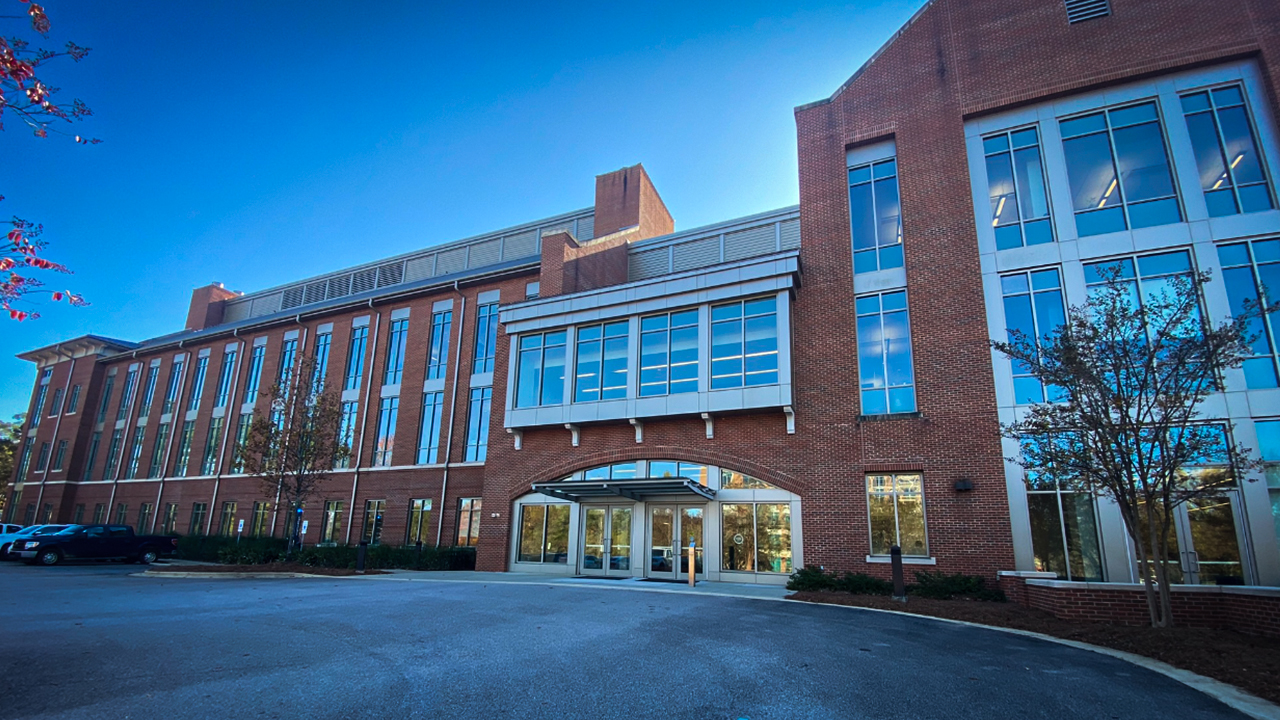
Auburn University CASIC Building
Center for Advanced Science, Innovation and Commerce
LOCATION
559 Devall Drive
Auburn, AL 36849
Parking is available in the front of the building (main lot) and overflow parking parking is located across the street at The Park building (570 Devall Drive).
CASIC CONFERENCE ROOMS
Conference rooms of various sizes at the CASIC building are available to book. Please email Megan Adamson for details.
Room 105 | Capacity: 10
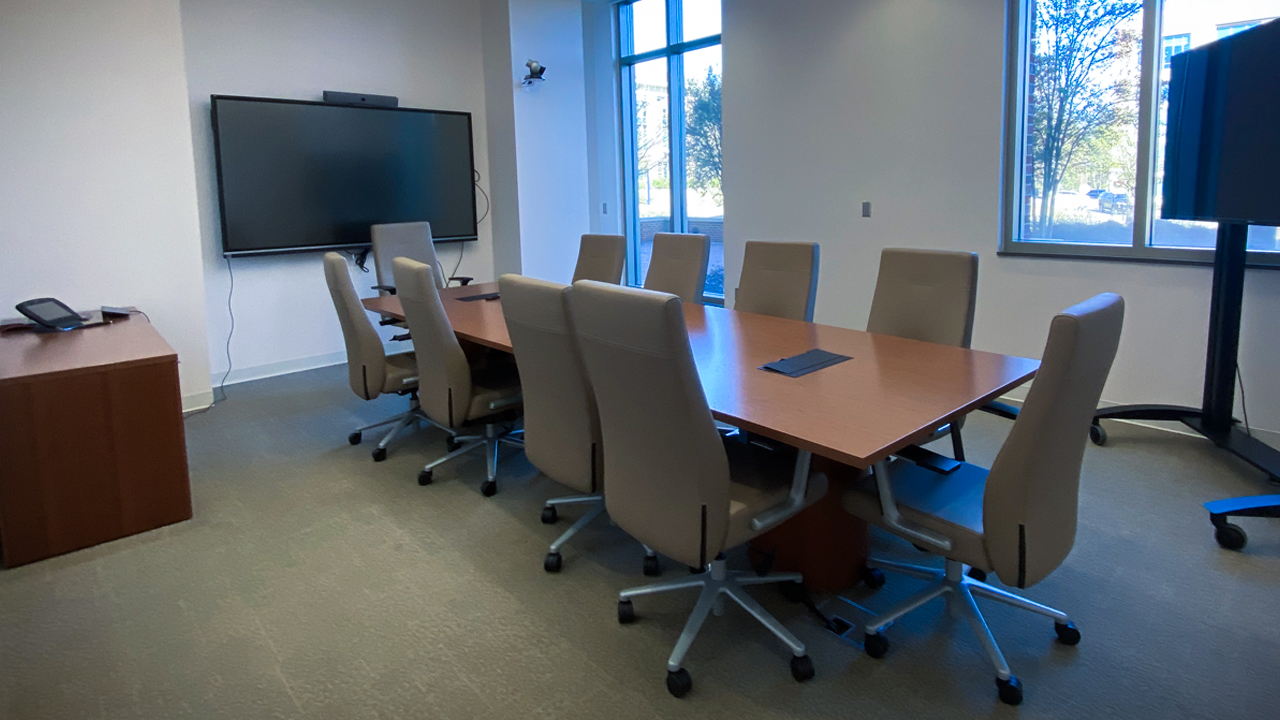
Technology:
- Zoom System
- Zoom TV Screen
- Projector
- Projector screen
- Additional normal tv
- Computer hook-up
- Camera
Room 109 | Capacity: 80
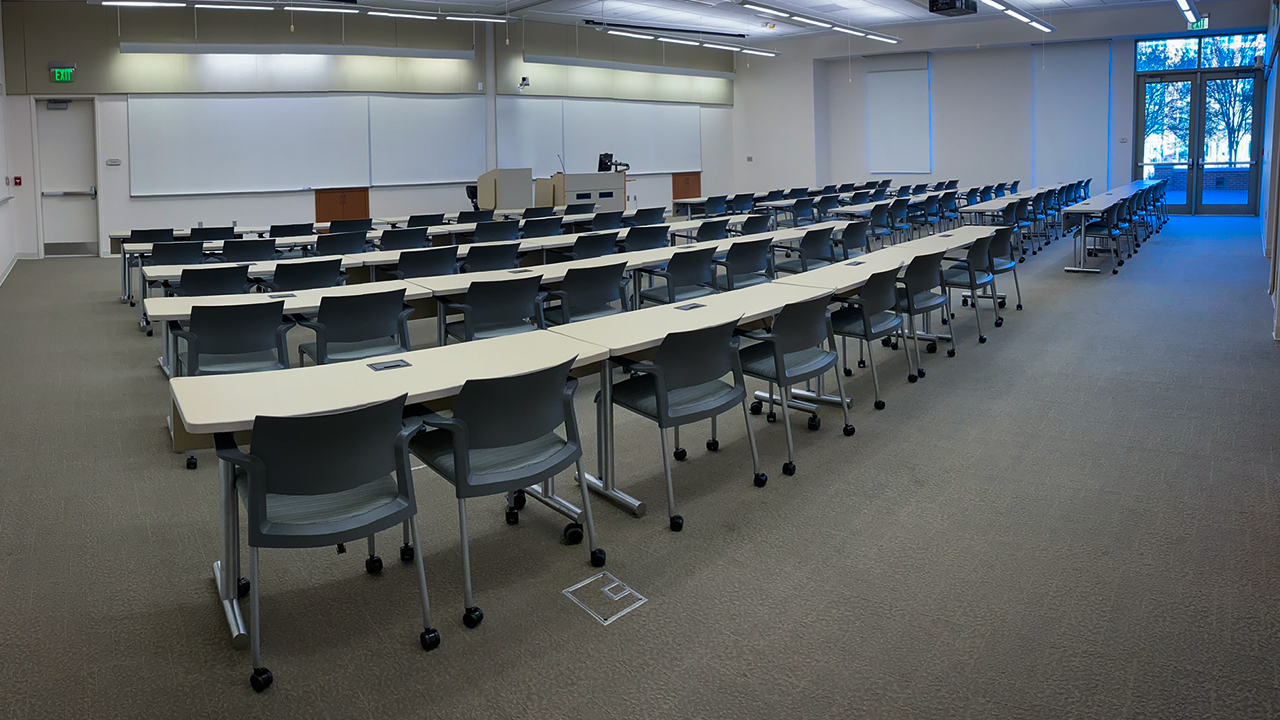
Technology:
- Two projectors
- Two projector screens
- Microphone
- Visualizer
- AMX control system
- Computer hook-up
- Surround sound
- Camera
Room 209 | Capacity: 10
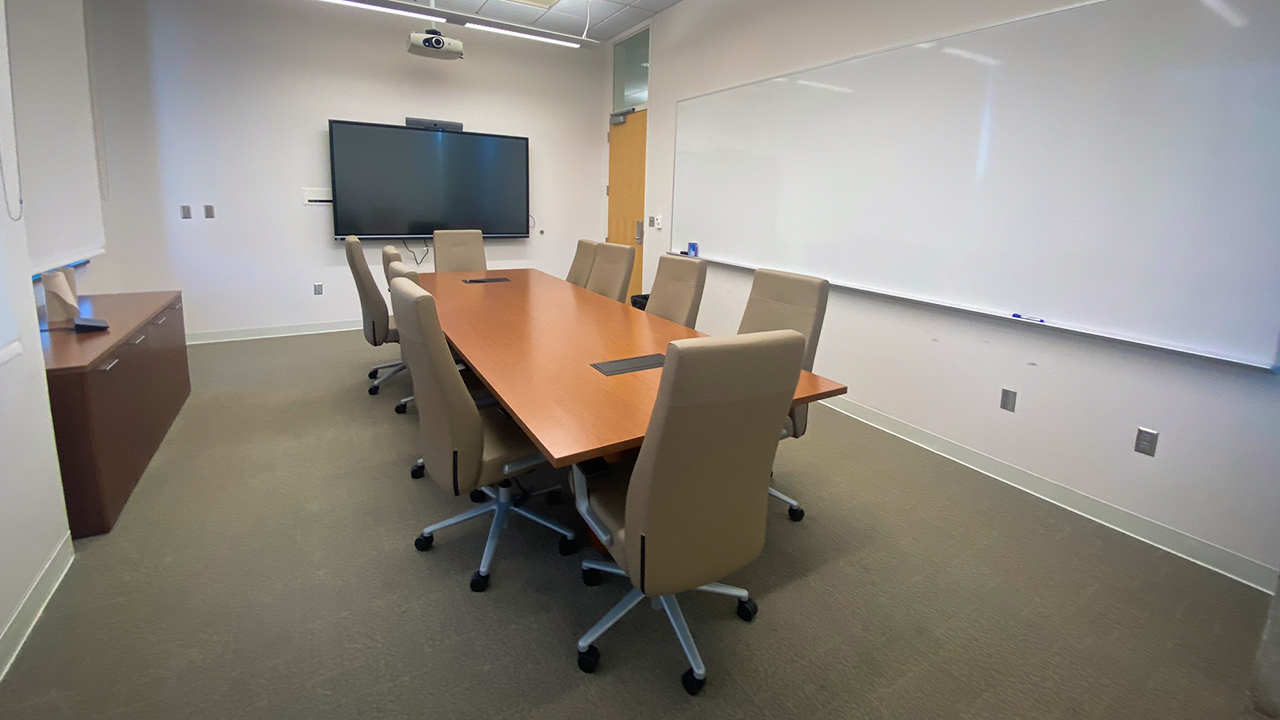
Technology:
- Zoom system
- Zoom Screen (with camera)
- Projector
- Projector screen
Room 301 | Capacity: 20

Technology:
- Projector
- Projector Screen
- Laptop hookup
- Mouse
- Cameras
CASIC DIRECTORY
Art Appel

Email: appelag@auburn.edu
Department: Entomology and Plant Pathology, College of Agriculture
Office: CASIC 261
Details: Dr. Appel oversees the day-to-day operations of the CASIC building.
Mehmet Zeki Billor
 Email: mzb0009@auburn.edu
Email: mzb0009@auburn.edu
Department: Geosciences, College of Sciences and Mathematics
Office: CASIC 207
Lab: 215
Details: The Inductively Coupled Plasma Mass Spectrometer (ICP-MS) Laboratory
1. Inductively Coupled Plasma Mass Spectrometer (ICP-MS): Our facility at the Auburn University Center for Advanced Science, Innovation, and Commerce (CASIC) boasts the addition of an Agilent 7900Quadrupole ICP-MS system. This sophisticated instrument enables high- resolution analysis of multi-elements ranging from lithium-6 to uranium-238 in both liquid and solid samples. The Q-ICP-MS excels at detecting trace elements reaching into the parts per trillion range. The ICP-MS sample introduction system is enhanced with the ESI Fast and prepFAST inline auto-dilution systems, which deliver rapid and precise sample preparation and throughput.
Analyses are conducted using the MassHunter software on a dedicated PC platform. MassHunter software ensures that the complex data generated is processed accurately and offers an intuitive interface for researchers to navigate easily through their analytical procedures.
2. High-performance liquid chromatography-mass spectrometry (HPLC-ICP-MS):
Agilent 1260 Infinity II LC is Coupled to Agilent 7900 ICPMS fort HPLC-ICP-MS abalysis. HPLC-ICP-MS is an analytical technique that combines the separation capabilities of HPLC with the detection abilities of ICP-MS. The strength of HPLC-ICP-MS lies in its ability to provide detailed information about the chemical form of the metals present. This is important because the toxicity and bioavailability of a metal often depend on its chemical structure, not just its concentration.
3. LA-ICP/MS: ESI Laser ablation NWR193 System Coupled to Agilent 7900 ICPMS: The LA-ICP/MS technology incorporates an ESI Laser Ablation NWR193 System integrated with an Agilent 7900 ICP-MS to achieve superior analytical performance from any solid material. This advanced setup is capable of generating finely particulate aerosols from solid samples. These aerosols are then efficiently transported to the ICP, where they are ionized with high precision.
4. Single Particle (sp)ICP-MS and Single Cell ICP-MS: ICP-MS can also quantitatively detect and analyze individual particles Single Particle (sp)ICP-MS and cells metal content (SC-ICP-MS).
5. Microwave Digestion System: The lab has Ethos Up high-performance microwave digestion system.The Microwave Acid Digestion System sample preparation by utilizing a closed-vessel mechanism, significantly reduces digestion time to mere minutes. This system is designed to process samples efficiently for subsequent trace and ultra-trace metals analysis, enhancing accuracy and throughput in laboratory settings.
The Ethos Up microwave digestion system has two advanced rotor systems to accommodate various sample processing needs. The SK-15 rotor boasts a high-pressure design with a capacity of up to 100 ml, making it versatile for all types of applications. On the other hand, the MAXI-44 rotor is designed for high- throughput scenarios, accommodating up to 44 TFM vessels, each with a volume of up to 100 ml.
The integration of the Agilent 7900 Quadrupole ICP-MS system into CASIC’s existing infrastructure positions us at the forefront of analytical science, enabling rapid and precise multi-elemental analysis and isotope ratio measurements across a diverse range of sample types. These include: Geological samples (sediments, rocks, minerals), Plants, Agricultural products, Soil, Biological samples, Water, Pharmaceutical products, Clinical chemistry, Food and beverage analysis, Material characterization (e.g., metals, glass), Archaeology, Nuclear sciences, Lithium-ion batteries, Toxicity assessments in biological systems within water, soil, and food.
Current Research Applications: Trace Element and Isotope Geochemistry of Oil-Field Brine and Sequestration of Molybdenum through Bioremediation
Ash Bullard
Email: sab0019@auburn.edu
Department: School of Fisheries, Aquaculture & Aquatic Sciences, College of Agriculture
Office: CASIC 387
Details: The Southeastern Cooperative Fish Parasite and Disease Laboratory provides disease diagnostic support and consultation regarding fish health management and aquatic invasive pathogens to member states (Alabama, Georgia, South Carolina, North Carolina, Tennessee, Kentucky, West Virginia, Arkansas, and Missouri). In addition to providing these critical services to state fisheries agencies, we also conduct research concerning fish parasite taxonomy, phylogenetics, pathobiology, and life history as well as diversity and pathobiology of microbes and viruses in aquatic vertebrates and invertebrates. In addition to state agencies, we work with private land owners, large- and small-scale fish producers, private industry, and relevant federal agencies with interests in aquatic pathogens and disease management. Our current and previous research has been funded by the Alabama Department of Conservation and Natural Resources (ADCNR), Alabama Marine Resources Division (ALMRD), Archer Daniels Midland Company, Arizona Salt River Project, Arkansas Fish and Game Commission (AFGC), Georgia Department of Natural Resources (GDNR), Gulf of Mexico Research Initiative (GoMRI), Kentucky Department of Fish and Wildlife Resources (KDFWR), Mississippi-Alabama Sea Grant, Missouri Department of Conservation (MDC), National Oceanic and Atmospheric Administration (NOAA), National Science Foundation (NSF), National Sea Grant, North Carolina Wildlife Resource Commission (NCWRC), South Carolina Department of Natural Resources (SCDNR), Southeastern Regional Aquaculture Center (SRAC), Tennessee Aquarium Conservation Institute (TNACI), Tennessee Wildlife Resource Agency (TWRA), United States Department of Agriculture (USDA), United States Fish and Wildlife Service (USFWS), Virginia Department of Conservation and Recreation (VDCR), and West Virginia Department of Natural Resources (WVDNR). Our fieldwork and expeditionary activities have been conducted in North America (Appalachian Mountains, many rivers and lakes throughout the United States, Florida Keys), Central and South America (Mexico, Colombia, Peru), Africa (Botswana, South Africa, Guinea, Mozambique, Namibia), Southeast Asia (Vietnam), Caribbean Sea (Cayman Islands, Puerto Rico), Gulf of Mexico (coastal and outer continental shelf, Mississippi Sound, Mobile Bay), Northwestern Atlantic Ocean, and Western Pacific Ocean (Micronesia)
Charles Chen

Email: cyc0002@auburn.edu
Department: Crop Soil & Environmental Sciences, College of Agriculture
Office: CASIC 267
Details: Primary research responsibilities are in peanut breeding, genetics, and
Wellison Diniz

Email: wzd0027@auburn.edu
Department: Animal Sciences, College of Agriculture
Office: CASIC 205
Lab: 221
Details: Have you asked yourself why animals with similar genetic potential, managed under the same conditions, perform better than others? Why do heifers under the same developmental program get pregnant while others fail? How do nutrition and genetics play a role in animal development and performance?
Paul Dyce
 Email: pwd0003@auburn.edu
Email: pwd0003@auburn.edu
Department: Animal Sciences, College of Agriculture
Office: CASIC 295
Lab: 327
Details:
1. Studying the ability of fetal porcine and postnatal mouse skin isolated stem cells to form germ cells under various in vitro culture conditions. The ability of stem cells to form germ cells in vitro opens up many possibilities to study germ cell formation under controlled in vitro conditions.
2. I am also interested in the exploration of intra-ovarian signaling pathways required for normal oocyte/embryo development within livestock species. This has the potential to improve in vitro oocyte techniques such as growth, maturation, and cryopreservation within agriculturally relevant species.
3. Develop molecular methods to improve heifer and gilt selection for reproductive potential in order to improve the productivity and efficiency of these valuable agriculture sectors.
My lab is a livestock animal reproduction lab. We study early cattle and swine in vitro fertilization and embryo development. We also study heifer fertility, specifically looking to develop fertility biomarkers.
Brendan Higgins

Email: bth0023@auburn.edu
Department: Biosystems Engineering, College of Agriculture
Office: CASIC 289
Lab: 150 & 153
Details: Our mission is to investigate processes that utilize algae and bacteria for waste remediation, water quality, plant production, and high-value product synthesis. We seek to understand underlying mechanisms that contribute to system performance, with a particular focus on organism interaction. Higgins is also the PI on the USDA NIFA-funded GRACE project focused on decarbonizing greenhouse vegetable production.
Timothy Hooper

Email: tph0016@auburn.edu
Office: CASIC 2203
Phone: 334-844-1431
Details: Tim joined AU’s College of Agriculture in 2018 as research support staff. He is a Certified Research Administrator (CRA) and assists research faculty develop and edit content in response to competitively reviewed federal grant programs. Tim also manages the state-funded Alabama Agricultural Experiment Station (AAES) grant program.
Samir Huseynov
Email: szh0158@auburn.edu
Department: Agricultural Economics & Rural Sociology, College of Agriculture
Office: CASIC 375
Details: The Experimental Economics Lab was established in 2021 by the Department of Agricultural Economics and Rural Sociology. In this facility, we can test economic theories in the controlled environment of a laboratory and provide researchers state of the art facilities to assist studies in individual and group behavior in various economic environments. The lab possesses eye tracking and facial expression analysis capabilities allowing researchers to investigate the role of attention and emotions in economic decisions.
Jacqueline (Jacque) Kochak
Kathy Lawrence

Email: lawrekk@auburn.edu
Department: Entomology and Plant Pathology, College of Agriculture
Office: CASIC 293
Lab: CASIC 249
Details: Areas of expertise are in soil borne and foliar fungal diseases specifically plant parasitic nematodes and fungi attacking field crops, vegetables, and ornamentals with emphasis on nematode and fungal pathogen interactions and host-pathogen relationships in the natural environment. The goals of my applied research (Hatch Project # ALA015-2-14003) are to develop and evaluate ecologically based plant disease management programs for the economically important crops in Alabama, and to deliver these programs to growers. My basic research uses a multidisciplinary approach to address fundamental questions in plant parasitic nematode pathogenicity as well as fungal pathogen interactions and host-pathogen relationships.
Mark Liles

Email: lilesma@auburn.edu
Department: Biological Sciences, College of Sciences and Mathematics
Office: CASIC 277
Lab: 255
Details: The Liles research group has an interest in three primary areas:
1. Metagenomic Analysis of Microbial Assemblages. We use a microbial community genomic approach (a.k.a.“metagenomic”) to study complex microbial assemblages in different environments. The research topics include expression of natural products (enzymes, metabolites) encoded by environmental metagenomes. In particular, we focus on expression of biosynthetic gene clusters obtained from soil metagenomes in order to characterize bioactive metabolites that can inhibit the growth of multidrug-resistant pathogens.
2. Biological control of disease using beneficial microorganisms. We have identified probiotic bacteria, particularly within the genus Bacillus, that can prevent and control disease in aquaculture farmed fish and in agriculturally important plants. We are investigating the natural products produced by these probiotics that can enhance growth performance of the animal or plant host, or inhibit the growth of pathogenic microorganisms. We also are investigatings ways to enhance the metabolism of these probiotics to enhance their in situ beneficial activities.
3. Pathogenesis and control of virulent Aeromonas hydrophila. Our studies have led to the development of diagnostic methods and a vaccine for a virulent strain of Aeromonas hydrophila that is responsible for severe epidemic outbreaks of disease in farmed fish in the United States, China and other countries. Our lab studies the pathogenesis of disease and the control of disease using both biological control agents and an attenuated vaccine. We are also helping the worldwide community of aquaculture researchers track the distribution and spread of virulent Aeromonas hydrophila.
For 1, Metagenomic analysis of microbial assemblages. We take samples from the environment to extract the all bacterial DNA present in the sample. Using data analysis, we are able to analyze the DNA and determine the genes that are present and predict natural products being produced by the bacteria. Through this process, we are analyzing metabolites that can inhibit antibiotic resistant bacteria.
For 2, Biological control of disease using beneficial microorganisms. We are testing probiotics to help combat diseases in aquaculture and horticulture. We are trying to understand what is being produced by the probiotic that helps the fish or plant grow better or inhibit the pathogenic bacteria. We are also investigating if there is a way to naturally encourage the probiotic to produce more of the beneficial product.
For 3, Pathogenesis and control of virulent Aeromonas hydrophila. A. hydrophila causes diseases in farmed fish throughout the world. Our studies have led to the development of diagnostic methods and a vaccine for a virulent strain of Aeromonas hydrophila. Our lab studies the pathogenesis of disease and the control of disease using both biological control agents and an attenuated vaccine. We are also helping the worldwide community of aquaculture researchers track the distribution and spread of virulent Aeromonas hydrophila.
Aniruddha Maity
Anna Mathis
 Email: acm0136@auburn.edu
Email: acm0136@auburn.edu
Office: CASIC 202L
Details: I’m a Grant Writing Support Specialist for the College of Agriculture. I’m a master’s student (Master of Technical and Professional Communication) in the Department of English and a GA for the COA.
Scott McElroy
Email: jsm0010@auburn.edu
Department: Crop Soil & Environmental Sciences, College of Agriculture
Office: CASIC 173B
Lab: 345 & 357
Yucheng Peng

Email: yzp0027@auburn.edu
Department: College of Forestry Wildlife and Environment
Lab: 157
Details: The Peng research group has an interest in four primary areas:
1. Biocarbon production for water pollution remediation
2. New applications of wood and biomass
3. Polymer composites and blends manufacturing and characterization for structural applications
4. Plastic packaging recycling and valuable polymer reclamation from plastic waste
Alicia Powers
Office: CASIC 263
Camila Rodrigues
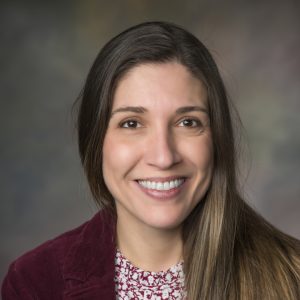
Email: czr0079@auburn.edu
Department: Horticulture, College of Agriculture
Office: CASIC 275
Lab: 133
Details: The Produce Safety Lab, under the guidance of Dr. Camila Rodrigues, is housed in the College of Agriculture’s Horticulture Department. Our lab studies a range of topics on food safety, including: identifying potential sources of fresh produce contamination; implementing mitigation strategies to minimize the risk of produce contamination on conventional, organic, and soilless farming systems; analyzing microbial risks associated with agricultural water, biological soil amendments, and post-harvest activities; and investigating alternative methods to minimize fresh produce contamination.
Sushan Ru

Email: szr0099@auburn.edu
Department: Horticulture, College of Agriculture
Office: CASIC 287
Lab: 357 & 359
Details: The small fruit breeding program at Auburn University aims to develop the finest blueberries for Alabama and nearby regions. We focus on developing southern highbush blueberries for better spring frost tolerance, disease resistance and fruit quality, while improving rabbiteye blueberries for early maturity, better fruit quality and disease resistance. My research focuses on improving the efficiency of blueberry production and breeding through high-throughput phenotyping, dissecting the genetic architecture of important traits such as disease resistance using interdisciplinary tools.
Brian Via

Email: brianvia@auburn.edu
Department: College of Forestry Wildlife and Environment
Lab: 123
Details: Collaborative work with agriculture in biomaterials, forest products, and energy.
Xu Wang

Email: xzw0070@auburn.edu
Department: Pathobiology, College of Veterinary Medicine
Office: CASIC 273
Lab: 243
Details: Dr. Wang’s primary research area is multi-omics analysis of health, performance, production, welfare, and disease in companion and farm animals, with emphasis from fundamental sciences to veterinary/agricultural applications. Wang laboratory uses next generation sequencing technologies and comparative and functional genomic approaches to investigate animal genome, transcriptome, DNA methylome, and microbiome. The ultimate goal is to enhance the health of all animals, including humans, and improve the production efficiency and welfare of farm animals.
Yifen Wang
Email: yangyif@auburn.edu
Department: Biosystems Engineering, College of Agriculture
Lab: 126
Details:
1. food processing, to develop value-added products and explore usage of by-products;
2. lifecycle of the sustainable packaging materials, to develop biodegradable active packaging films and their application to food/drug, and promote petroleum-based plastic recycling;
3. biofuel and biomaterials, to develop methods and systems for generating biofuel and materials for biodegradable films from bio-based feedstock with and without the assistance of radio frequency (RF) heating; and
4. Biomedical/functional foods, to extract, separate, purify, identify and microencapsulate bioactive elements from algae and other aquatic biomaterials, and study the inhibition of bioactive elements that influence childhood obesity and its concomitant symptoms.
Nathan Whelan

Email: nvw0001@auburn.edu
Department: School of Fisheries, Aquaculture & Aquatic Sciences, College of Agriculture
Office: CASIC 285
Lab: 237
Details: The Southeastern Conservation Genetics Lab is a United States Fish and Wildlife Service lab that is co-located with the School of Fisheries, Aquaculture, and Aquatic Sciences at Auburn University. We are a federal research lab, but our hybrid status as a USFWS lab and a lab at Auburn University makes us uniquely positioned to answer pressing questions in conservation science and train the next generation of conservation researchers and practitioners. Lab members include both federal employees, Auburn students and employees, and personnel with dual appointments. Our research projects focus on taxonomy, systematics, and population genetics of freshwater projects.
Marnin Wolfe

Email: mdw0092@auburn.edu
Department: Crop Soil & Environmental Sciences, College of Agriculture
Office: CASIC 383
Details:The Wolfe Lab engages in fundamental and applied research about the inheritance of genetically complex, and multivariate phenotypes in crop species and their associates. Our goal is to help build soils, deliver ecosystem services, support farmers’ profitability and adaptation to climate change in Alabama and the Southeastern US. We use genomic prediction, genome-wide association mapping and high-throughput phenotyping to determine breeding values and cultivar performance to make selection decisions, often referred to as genomic selection. We are establishing a cover crop and forage cultivar breeding program at Auburn to deliver cultivars that excel under mixed cultivation conditions. As part of this effort we study the genetics of interactions between species in cropping systems, including intercrops, rotations and species mixtures, to understand performance and productivity under those conditions. We are also pursuing international research and development efforts focused on intercropping practices, especially for cassava farmers in Africa and Latin America. We are passionate about achieving sustainability through diversification and conservation tillage practices in cropping systems.

